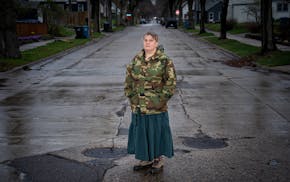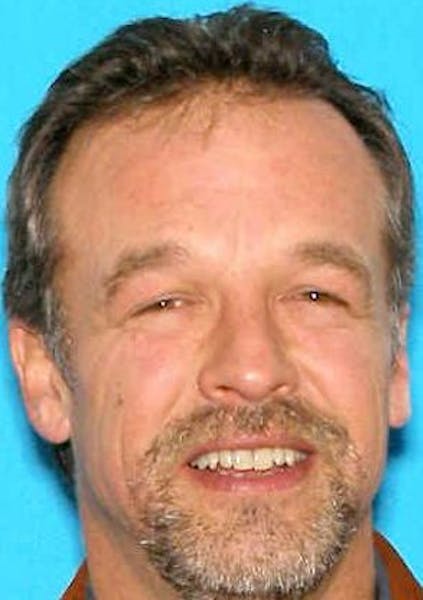Long before he formed the River Road Fellowship, minister-turned-fugitive Victor Barnard was just a kid playing hockey along Minneapolis' River Road.
Today, Barnard is the target of a multistate manhunt, as investigators look into charges that he was a cult leader who kept a flock of girls and young women, whom he called "The Maidens," as concubines. But for the people who knew and loved him, those headlines are hard to reconcile with the bright, charming boy and talented athlete they remember.
"I always thought I'd be seeing him on TV," said his father, Stanley Barnard. "I thought it would be the Olympics, not like this."
Two young women have stepped forward to accuse Barnard, who led the isolated River Road Fellowship in Finlayson, of sexually abusing them for years, beginning when they were just 12 and 13. Authorities in Washington State are searching, but have yet to locate Barnard.
It's a far different future than the one expected for young Vic Barnard, whose prospects once seemed bright and limitless — until he fell in with the Way, and lost his way.
A gifted student and athlete, he earned a scholarship to the elite Breck prep school, then still at its old home on River Road in Minneapolis. By the time he graduated in 1979, he was class president, captain of the hockey team and a varsity player on the baseball and football teams. Friends remember him as the kind of kid who could turn heads just by walking into a room.
"He had a lot of charisma — a big personality," classmate Mark Gillman recalled. "He knew a lot of people and everybody knew him."
Tough home life
Barnard got a scholarship to Hobart College in upstate New York, where he made the varsity hockey squad his freshman year.
But Barnard's life wasn't quite as happy as his big smile in the high school yearbook made it seem. His parents divorced when he was six and he and his three sisters were raised by a mother who struggled with deepening mental illness.
"My ex-wife, his mother, was bipolar. Of course, back then, we didn't even know what that was," his father said.
Victor's mother, Nancy, started calling him repeatedly while he was away at college, saying "all these nutsy things," Stanley Barnard said. Victor "was crying in his room," a day after one of the disturbing phone calls from his mother, Stanley Barnard recalled. Someone walked by and said, "'You look like you need Jesus in your life.'" That stranger was named Reggie, a recruiter from the Way International, a religious sect based out of Ohio.
That's when "the problem started," his father said.
A different path
The next thing his friends and family knew, Victor had quit the hockey team, dropped out of Hobart and headed to Kansas to attend the Way College in Emporia. His graduation photo shows him smiling proudly, holding a leather-bound Bible. Soon, he began sounding out his friends about the Way. If they weren't interested, he cut ties.
He came out to visit his friend Gillman, who was going to school in Wisconsin and shared a ride with Barnard back to Minneapolis that weekend. "He brought up the Way. I didn't really bite on that. … I never talked to him again."
In the parlance of the Way, it was known as "mark and avoid," a technique of shunning those with different beliefs and views. Some of his friends got a harder sell, including his former high school girlfriend, who asked not to be identified.
"He came home from school that year just so pumped up about [the Way], and wanted me to join him and go to these classes with him: the 'Power for Abundant Living' classes," she recalled. Barnard had a regional manager in the sect follow her and call her at all hours, trying to deprive her of sleep, she claims.
Eventually, Barnard and his Way colleagues wore her down and persuaded her to sign up for the class — and to sign over one of her paychecks in the process. That's when her family stepped in.
Her father and brother went with her to the class and insisted on a refund. Then, she said, she saw the dark side of the group that had been wooing her for weeks.
"This person, who had been just lovely to me all summer, turned on me and started using all sorts of horrible words," she said. "They said, 'Get out of this house. I don't want any more communication with you, nor will Victor have any more communication with you.' I never saw Victor again."
Now, with Barnard's name and face all over the news, she is haunted by thoughts of the Maidens.
"I was so sad for these girls,'" she said. "I was helped, because I had the support of my family, but they have been left with nothing."
The Way's ways
Barnard was one of nearly 400 followers of the Way International who in 1983 entered its leadership training program called the "Way Corps." Karl Kahler was another.
Kahler, who joined the Way International in 1980 at age 16, remembers Barnard as "a friendly, smiling, mellow people person," he said Friday. "I didn't view him as a real leader of his peers or a hard-charging personality." But, he added, "I can see where he had the charismatic qualities to develop a following."
In the four-year program, the young men and women learned everything from how to shake hands to how to climb rocks. They practiced leading weddings and funerals. They studied public speaking. "We were trained to be leaders — people who could get up in front of a crowd," said Kahler, now the national editor of the San Jose Mercury News.
Reading about the charges against Barnard, Kahler sees echoes of Victor Paul Wierwille, the Way's former leader, who died in 1985.
Kahler, author of "The Cult That Snapped," cited a speech in which Wierwille says that King David is not to be criticized for adultery because every woman in the kingdom belongs to the king. There was "a culture of adultery" in the Way, he said. "There were plenty of leaders who thought it was their right to have sex with their followers."
The Way International splintered after Wierwille's death, Kahler said. "The ministry virtually collapsed," he said. "Lots of new leaders arose, left the ministry and took their followers with them."
Building a following
By 1990, Barnard had returned to Minneapolis, registering a business, Lost and Found Enterprises, to a home in north Minneapolis.
The following year he and his friend and fellow Way member David Larsen moved to Rush City, Minn. to homes along another River Road. They rented state parks or resorts to put on religious retreats but then began playing with the idea of creating a camp. Larsen heard about a former Christian camp on a lake in Finlayson called the Shepherd's Inn.
Barnard and other leaders envisioned the new property, which they called Shepherd's Camp, as a place for retreats and discipleship.
For Stanley Barnard that simple life of growing their own food, running small artisan businesses and raising goats and sheepdogs, is what he saw on his occasional visits.
"There was no cult going on, or anything like that," he said. "They wanted to be self-sufficient and study the Bible."
But according to the charges released last week, Barnard persuaded parents in the isolated community to send 10 girls and young women to live together at the Shepherd's Camp in a position of honor as the "maidens." Barnard ruled "like a rock star" over the camp and would allegedly call for one maiden or another from "the Lodge," where he lived, to have sex with him.
One of the women, Lindsay Tornambe, told investigators that a month after becoming a maiden at age 13, Barnard raped her. He continued sexually assaulting her over the course of nine years.
Barnard taught the girls that he represented Jesus, the charges say, and that "sex with him was not wrong because he was a Man of God and she would remain a virgin because of it." The charges are based on the accounts of Tornambe and another former maiden, and multiple former members of River Road Fellowship confirmed Barnard's power over the group.
Those are difficult charges for Barnard's family and former friends to read.
"I'm not saying he didn't do something wrong," said Stanley Barnard, who has not heard from his son in a very long time. Stanley Barnard saw the influence Victor had over the members of his congregation, including one of his own sisters. "He was the accepted leader of the whole thing … They idolized him. I'm sure it all eventually went to his head."
Looking back, Larsen sees now how Barnard's whole purpose with the camp shifted from fellowship to cloaking the alleged sexual assaults. Barnard had always been a controlling person, Larsen said, "but not anything like what he became."
"Everything became about trying to cover it up, control it, hide it," Larsen said. "To me the real story is how something can start off good and end up so raunchy."
Star Tribune staff writer Pam Louwagie contributed to this report.
jennifer.brooks@startribune.com • 612-673-4008
jenna.ross@startribune.com • 612-673-7168
One day in the frantic life of a Children's Minnesota emergency room nurse
Sen. Nicole Mitchell off committee assignments while case under review

